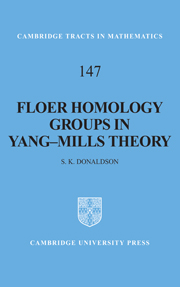
-
Select format
-
- Publisher:
- Cambridge University Press
- Publication date:
- August 2009
- January 2002
- ISBN:
- 9780511543098
- 9780521808033
- Dimensions:
- (228 x 152 mm)
- Weight & Pages:
- 0.532kg, 246 Pages
- Dimensions:
- Weight & Pages:
- Series:
- Cambridge Tracts in Mathematics (147)
You may already have access via personal or institutional login- Series:
- Cambridge Tracts in Mathematics (147)
Book description
The concept of Floer homology was one of the most striking developments in differential geometry. It yields rigorously defined invariants which can be viewed as homology groups of infinite-dimensional cycles. The ideas led to great advances in the areas of low-dimensional topology and symplectic geometry and are intimately related to developments in Quantum Field Theory. The first half of this book gives a thorough account of Floer's construction in the context of gauge theory over 3 and 4-dimensional manifolds. The second half works out some further technical developments of the theory, and the final chapter outlines some research developments for the future - including a discussion of the appearance of modular forms in the theory. The scope of the material in this book means that it will appeal to graduate students as well as those on the frontiers of the subject.
Reviews
‘… relatively short but very infomative, modern and clearly written … I stronly recommend the book to both specialists and graduate students’.
S. Merkulov Source: Proceedings of the Edinburgh Mathematical Society
‘… a compact but very readable account.’
Source: Mathematika
'… gives a nice account of the theory of an interesting topic in contemporary geometry and topology. It can be strongly recommended …'.
Source: EMS Newsletter
Contents
Metrics
Altmetric attention score
Full text views
Full text views help Loading metrics...
Loading metrics...
* Views captured on Cambridge Core between #date#. This data will be updated every 24 hours.
Usage data cannot currently be displayed.
Accessibility standard: Unknown
Why this information is here
This section outlines the accessibility features of this content - including support for screen readers, full keyboard navigation and high-contrast display options. This may not be relevant for you.
Accessibility Information
Accessibility compliance for the PDF of this book is currently unknown and may be updated in the future.


